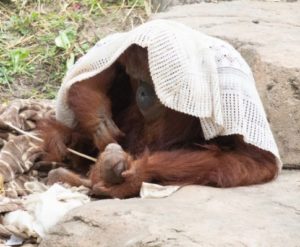Animal care staff at the Audubon Zoo encountered a welcome surprise on the morning of February 28. A critically endangered Sumatran orangutan gave birth to an infant. Although early signs and physical changes pointed to an anticipated due date between April and May, those indicators appeared later than normal and the birth happened earlier than expected.
Mother and the infant appear to be doing well as they bond out of public view under the care of the zoo veterinarian and primate team. Staff are monitoring the infant’s health closely for any signs of weakness or dehydration. The

An endangered Sumatran orangutan named Reese gave birth to an infant at the Audubon Zoo on the morning of February 28. Photo courtesy of Audubon Nature Institute.
“We received the best kind of surprise,” said Audubon Zoo’s Curator of Primates Liz Wilson. “It just goes to show that, despite all of the uncertainty in the world currently, life is carrying on as normal for our orangutans. It’s really uplifting to see.”
This new arrival is the first offspring for the zoo’s 12-year-old orangutan Reese following successful breeding with Jambi, the zoo’s male orangutan.
Maintaining a genetically diverse population of orangutans in human care is important because the species has been assessed by the International Union for Conservation of Nature as “critically endangered” and therefore threatened with extinction. Fewer than 14,000 Sumatran orangutans live in the wild and their numbers are declining, mainly due to increased human contact from to the spread of palm oil plantations into their forest habitat.
“To help orangutans in the wild, we recommend purchasing products with sustainably grown palm oil,” said Wilson. “Around the world, those using sustainable practices in logging and agriculture are demonstrating that it is possible to conserve wildlife habitat while supporting the local economy.”
For more information about the Audubon Zoo and Nature Institute visit their website.




